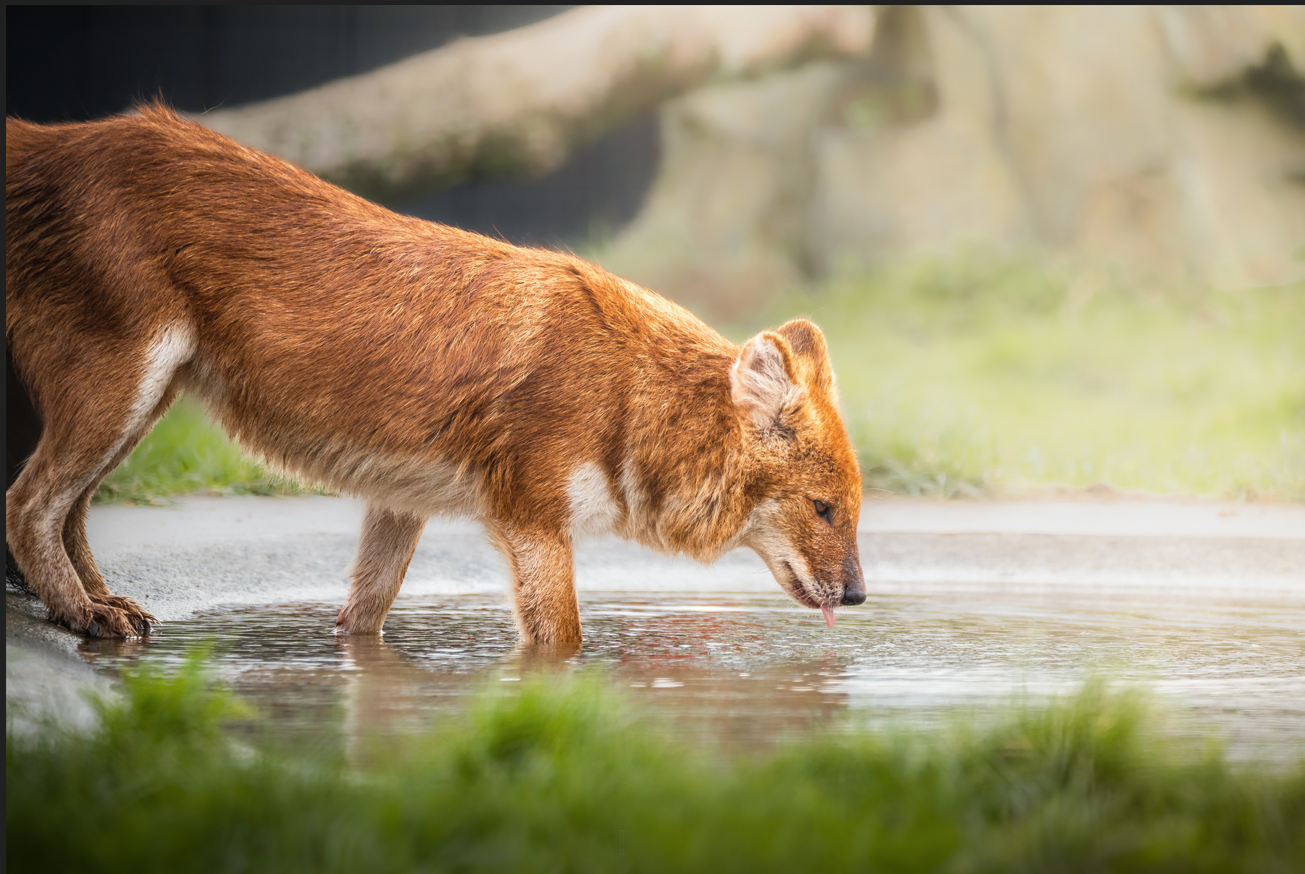Chelsea Davis tells BIAZA about her passion for the Dhole and why they need conserving for International Dhole Day.
Go to a toy store or zoo and look over at the plush toys. Tigers, elephants, seals, and wolves are standard, but you might also see some interesting ones like an axolotl, kinkajou, or even a blobfish. One you won’t find is the dhole or Asian wild dog. These medium-sized wild dogs with rust-colored fur are also known as the whistling hunter for their unique communication sound. With less than 2,500 adult dholes at the last estimate, it's a wonder that more people have not heard of them.
 Dhole at Folly Farm. Photo credit: Megan Lee
Dhole at Folly Farm. Photo credit: Megan Lee
When I first started working with dhole conservation in 2017 there were very few people working with dholes, let alone working on fixing what I consider to be a huge conservation problem for the species and that’s public awareness. Now 7 years later there is a small but invested group of individuals in the IUCN Dhole Working Group looking into the research questions surrounding dholes. I realized the best way I could help dholes wasn’t through research but by helping researchers get the funding they need and helping get their data and findings seen by outsiders.
It all started with the creation of an NGO called the Dhole Conservation Fund. A website was created and then expanded to include social media, from local talks to now global podcasts. Slowly the word about the dhole has grown. So far my best accomplishment for dhole awareness has been the establishment of World Dhole Day on May 28th. As dhole conservation has grown so has the participation of World Dhole Day. From just a social media presence in its first year, to now having representation on three continents.
The hope is that more people will become interested in dholes. The Dhole Conservation Fund did a survey in 2017 to see what people knew about dholes or if they had even heard of them. Out of the four wild canines on the survey (wolf, manned wolf, African wild dog, and dhole), the dhole was the most often misidentified. This survey was mainly completed by a knowledgeable audience, primarily zoo keepers and biologists, most of whom have some education above grade school.
When it comes to conservation threats, dholes have been fortunate to be adaptive. They still have issues with habitat loss, disease, and human conflict; but have benefited some from tiger and large cat conservation. However this has been a double-edged sword, big cat conservation has worked to increase tigers, but smaller or more fragmented habitats that could be utilized by dholes have not gotten the protection or restoration that could help them. There is also a gap in our understanding of what dholes truly need to survive in the modern world. It's not yet known how the fragmentation of habitat and human use of land and resources are affecting dhole populations. Even the population map for dholes has missing spots, Cambodia for example is known to have dholes but is this a small fragmented population or a larger population that has been able to connect? A big question left is how dholes impact their ecosystem. There has been one study that found dholes help keep wild bore numbers in check which helps locals with their crops. They do select prey differently than tigers and leopards so it would stand that they impact their environment differently.
There is a lot of hope for dholes that with a little help and understanding, they can make a rebound. With large litter size and the ability to disperse, there is a chance for dholes. Nepal has seen dholes naturally repopulate in the protected areas of the country. Being habitat generalists, they avoid deserts but seem to be able to tolerate most others, and active hunters mean they are adaptive and can change their behavior to the resources given to them. As long as there is prey and water, dholes can make a living. The only thing not in their favor now is being upstaged. Elephants, pandas, tigers, and rhinos all take the main stage. With only 2,500 adult dholes left, the dhole needs to be considered a conservation main player.
By Chelsea Davis
All blogs reflect the views of their author and are not necessarily a reflection of BIAZA's positions
-
News
.png?w=100&h=100&zc=1&f=jpeg&hash=97e6d151315c515d23f80e6ee9d1d533) Love is in the air as pygmy marmoset Tumble arrives at Shaldon Wildlife Trust 13th February, 2026Shaldon Wildlife Trust is celebrating a very small but very special love story this Valentine’s season with the arrival of a new female pygmy marmoset…
Love is in the air as pygmy marmoset Tumble arrives at Shaldon Wildlife Trust 13th February, 2026Shaldon Wildlife Trust is celebrating a very small but very special love story this Valentine’s season with the arrival of a new female pygmy marmoset… -
News
.png?w=100&h=100&zc=1&f=jpeg&hash=65ba18ab3dddd57e0f31f999ec4849db) Double baby joy at Paignton Zoo as second rare white monkey born 11th February, 2026Paignton Zoo is celebrating a rare double baby boom after welcoming a second endangered king colobus monkey this winter, marking the zoo’s first…
Double baby joy at Paignton Zoo as second rare white monkey born 11th February, 2026Paignton Zoo is celebrating a rare double baby boom after welcoming a second endangered king colobus monkey this winter, marking the zoo’s first… -
News
.png?w=100&h=100&zc=1&f=jpeg&hash=92e90cf6a944ad40ff665483a5744aa4) Blog: Zoos have a duty to source their plants sustainably 10th February, 2026Do you know where your purchased plants come from? In our latest blog, the BIAZA Plant Working Group details how zoos/aquariums can work together…
Blog: Zoos have a duty to source their plants sustainably 10th February, 2026Do you know where your purchased plants come from? In our latest blog, the BIAZA Plant Working Group details how zoos/aquariums can work together…



